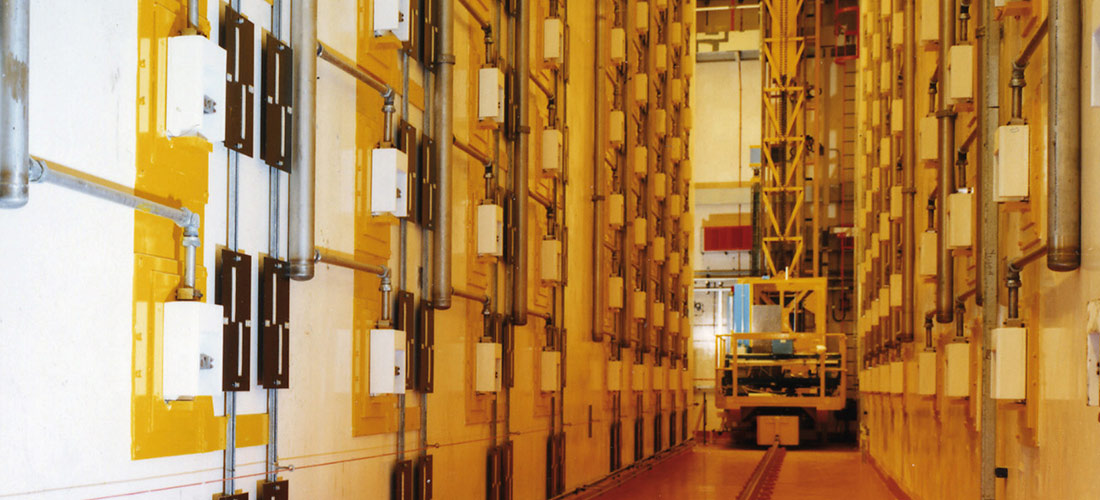Managing the UK plutonium stockpile: no easy choices
Our paper examines the key things that government must consider when making the tough choice: should the UK plutonium stockpile become waste or energy?

Plutonium storage at the Sellafield nuclear site. Photo credit: Nuclear Decommissioning Authority, 2019.
Over the last six decades, the UK has built up a stockpile of some 140 tonnes of civil plutonium, currently stored as plutonium dioxide powder in Sellafield. After the period of storage, what should happen to it? Should it be used in future nuclear reactors, or should it be treated as waste and disposed of in the planned UK geological disposal facility?
The paper
Managing the UK plutonium stockpile: no easy choices
How could the plutonium be useful for future reactors? Firstly, it could simply be used as fuel for existing or future thermal reactors; secondly, it could also be used to kickstart the process of utilising the UK's 100,000 tonne supply of Depleted, Natural and Low-Enriched Uranium (DNLEU) in fast reactors, which has the potential to power the UK for centuries. There may even be applications in future fusion reactors.
While this all sounds promising, successfully delivering such outcomes would take time, money and organisation; and as it stands, the Nuclear Decommissioning Authority is in the process of repackaging the plutonium stocks into more robust containment. The future may ensure that extracting the energy from the plutonium is unnecessarily expensive, and it might be simpler and cheaper to consider it a waste material alongside the other waste from the nuclear industry, and safely dispose of it.
“Decide in haste, repent at leisure” has been a long-time feature of UK decision making in nuclear power. In this paper we outline ten key recommendations to assist UK policymakers in making the best decisions in good time.
The authors
-
William Bodel - Research Associate in Nuclear Systems Choice, Dalton Nuclear Institute
Will's doctoral research into nuclear engineering materials focused on nuclear graphite and its behaviour under reactor conditions. He subsequently worked on material fracture and life-extension of the UK’s AGR fleet. His current research focus is on energy policy, and nuclear energy for net zero.
-
Adrian Bull MBE - BNFL Chair in Nuclear Energy and Society, Dalton Nuclear Institute
Adrian joined Dalton from his position as the National Nuclear Laboratory's External Relations Director. He also worked for BNFL for 23 years and Westinghouse for six. He was awarded an MBE for his work on improving stakeholder engagement around nuclear issues – a subject he is passionate about.
Read more on Adrian’s research profile
-
Gregg Butler - Head of Strategic Assessment, Dalton Nuclear Institute
Gregg has over 50 years’ experience in most aspects of the nuclear fuel cycle: R&D, planning, commercial, plant, site and company operations and management, director and advisory committee roles. He has published extensively on nuclear topics, and is currently concentrating on Nuclear Energy’s role in Net Zero.
Read more on Gregg's research profile
-
Robert Harrison - Senior Lecturer in Nuclear Fuel Technology, Dalton Nuclear Institute
Robert has over 10 years’ research experience in nuclear fuel cycle research, having held positions in industry (National Nuclear Laboratory) as well as academia. His current research focuses on advanced manufacturing routes to nuclear fuel and wasteforms as well as examining nuclear fuel behaviour during reactor operating conditions.
-
Juan Matthews - Visiting Professor in Nuclear Energy Technology, Dalton Nuclear Institute
Starting as a theoretical physicist, Juan carried out and managed research on nuclear safety and advanced reactor systems at Harwell. He later set up and managed activities across Asia for AEA Technology, before working on international business and innovation in the nuclear and energy sectors, mainly for Government.
-
Daniel Warrilow-Brennan - Research Associate in Actinide Materials, Dalton Nuclear Institute
Daniel is an inorganic materials chemist and is interested in actinide materials chemistry and special nuclear materials, condensed matter physics, and applications of synchrotron radiation techniques. He read pure chemistry at the University of Birmingham, then moved to Liverpool to conduct research on metal-organic frameworks for toxic industrial chemical capture. He is currently investigating how stored plutonium materials have aged and how they will behave in the future.
Read more
The Deputy Director
The University of Manchester’s Dalton Nuclear Institute is a world-leading cross-disciplinary nuclear research institute, providing research across the whole fuel cycle, delivering impact to industry, governments and regulators, and supporting the UK’s long term nuclear ambition. Read more about the Dalton Nuclear Institute.







